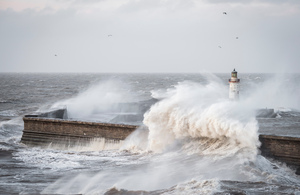The Shipping Forecast broadcast turns 100
The Maritime and Coastguard Agency is celebrating the 100th anniversary of the first broadcast of the Shipping Forecast.

Quintessentially British and symbolic of a nation steeped in maritime tradition, the 100th anniversary of the first broadcast of the Shipping Forecast should be celebrated as a key moment when safety became a priority at sea.
It was exactly one hundred years ago, on 1 January 1924, that the very first clipped, British tones were heard delivering a weather bulletin called Weather Shipping.
In the UK, the Maritime and Coastguard Agency (MCA) is responsible for the provision of maritime safety information (MSI) to ships at sea, which includes the broadcast of warnings and forecasts. The iconic Shipping Forecast is a BBC Radio broadcast produced by the Met Office on behalf of the MCA. Although the Shipping Forecast officially came into existence in 1924, it was in October 1925 when it was first broadcast via the BBC.
We spoke to the Met Office’s archivist Catherine Ross about the significance in 2024 of the Shipping Forecast.
It’s a national institution,” Catherine, who has spent the past 11 years trawling the rich archives of the Met Office said.
That has so much more meaning behind it than just a forecast. It’s iconic.
It’s a history of the last 100 years of what’s happened around our shores, from a weather perspective of course but also maritime safety; the two are heavily linked and it is a big part of why the Met Office even exists.
The history of the forecast goes back to 1861, when Vice-Admiral Robert FitzRoy developed a telegraphic messaging system to issue weather warnings to ships, following the loss of the steam clipper Royal Charter. The vessel founded (sank) in a violent storm off the coast of Anglesey, with the loss of more than 450 lives, prompting FitzRoy’s desire to prevent it happening again.
He was the main influence in the early development of the Met Office, which was then primarily intended to improve safety at sea.
It has saved thousands, possibly even hundreds of thousands of lives,” Catherine added.
It is impossible to accurately predict how many, but it really has been lifechanging for seafarers.
Its relevance has probably changed from when its sole purpose was to provide information to UK mariners, because of all the technology and internet it can now be heard from anywhere in the world.
It has 100 years of trust behind it now and it has taken on a cultural aspect far beyond the maritime world, which all adds to its iconic status.
Technology will continue to move on, but that distinctive sound it has will remain for as long as people want it.
It’s almost poetic, almost beautiful, in the way that fixed-pattern forecast is read out. I really like the sound of it and know a lot of people do, it is familiar and it’s a voice from home.
In fact, it’s the voice of home.
Press office
Email public.relations@mcga.gov.uk
Press enquiries (Monday to Friday, 9am-5pm) 0203 817 2222
Outside these hours or on bank holidays and weekends, for media enquiries ONLY, please send an email outlining your query and putting #Urgent in the subject title.